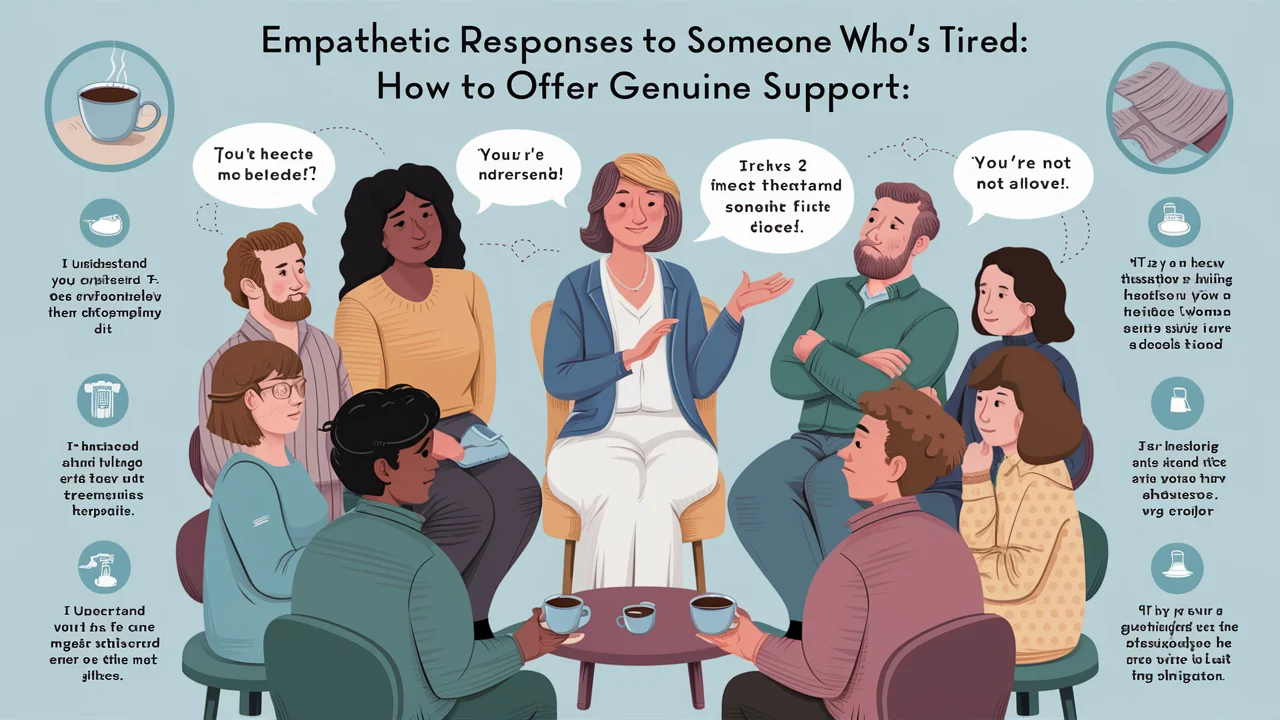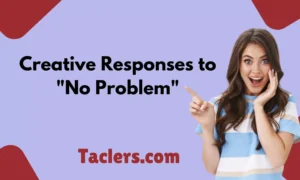Fatigue is a universal experience that touches everyone at some point in their lives. Whether it’s physical exhaustion, emotional burnout, or mental strain, the feeling of being utterly drained can leave a person feeling isolated and overwhelmed. In these moments, offering the right words of support can make a world of difference. But how do you respond to someone who says they’re tired in a way that’s truly helpful and empathetic?
This comprehensive guide will explore a variety of responses you can use when someone shares that they’re feeling tired. We’ll dive deep into why these responses work, how to tailor them to different situations, and what you can do to offer genuine support without overstepping boundaries. Let’s get started.
Understanding Fatigue: The Different Types and Their Impact
Before we jump into specific responses, it’s important to understand the different types of fatigue someone might be experiencing. Fatigue isn’t just about being physically tired; it can also be emotional or mental. Understanding the nature of their exhaustion will help you provide the most appropriate and supportive response.
Physical Fatigue
Physical fatigue occurs when the body is worn out from physical activity, lack of sleep, or illness. It’s the kind of tiredness that makes it difficult to move, think, or function normally. This type of fatigue often requires rest, nutrition, and sometimes medical attention.
Emotional Fatigue
Emotional fatigue is the result of prolonged stress, anxiety, or emotional strain. It’s the feeling of being emotionally drained, where even small tasks feel overwhelming. This type of fatigue often leads to feelings of hopelessness, irritability, and detachment.
Mental Fatigue
Mental fatigue happens when the brain is overworked, often due to prolonged periods of concentration or decision-making. It can result in difficulty focusing, forgetfulness, and a general sense of mental sluggishness. Rest and mental relaxation are key to overcoming this type of fatigue.
The Impact of Fatigue
Fatigue, in any form, can significantly impact a person’s quality of life. It can affect their work, relationships, and overall well-being. Understanding the type and impact of their fatigue will guide you in offering the most empathetic and effective support.
Offering Help with Specific Actions

When someone expresses that they’re tired, one of the most direct ways to offer support is by suggesting specific actions you can take to help them. This shows that you’re not just offering empty words, but are genuinely willing to lighten their load.
Example Response
“I hear you. Is there anything I can do to help lighten your load?”
Why This Works
Offering specific help can be incredibly relieving for someone who feels overwhelmed. It shows that you recognize their struggles and are willing to step in and assist with practical tasks. Whether it’s taking over a project, running an errand, or simply being there to listen, offering help in a tangible way can make a significant difference.
When to Use This Response
Use this response when you know the person might be struggling with specific tasks or responsibilities. It’s particularly effective in situations where you can offer direct, practical assistance, such as helping with work, household chores, or childcare.
Suggesting a Relaxing Break
Sometimes, what a tired person needs most is a break—a moment to step away from their responsibilities and recharge. Suggesting a relaxing activity can provide them with a much-needed mental and emotional reset.
Example Response
“Sounds like you could use a break. Want to grab a coffee and chat?”
Why This Works
Suggesting a break acknowledges that they need time to relax and unwind. It also provides an opportunity for them to talk about what’s bothering them, or simply enjoy a distraction. A change of scenery, even for a short time, can do wonders for someone who is feeling overwhelmed.
When to Use This Response
This response is ideal for informal settings, such as with friends or coworkers. It’s perfect for those moments when you notice someone is stressed and could benefit from stepping away from their work or daily routine for a brief period.
Encouraging Self-Care and Kindness
Reminding someone to be kind to themselves and prioritize self-care is a powerful way to show support. Often, people who are tired or stressed forget to take care of their own needs, and a gentle reminder can be just what they need.
Example Response
“I’m sorry you’re feeling drained. Remember to be kind to yourself and take breaks when you need them.”
Why This Works
This response is effective because it shifts the focus to self-care, encouraging the person to take the time they need to rest and recharge. It’s a gentle nudge that their well-being is important and that they shouldn’t push themselves too hard.
When to Use This Response
Use this response when the person you’re talking to seems to be neglecting their own needs. It’s particularly useful in high-stress environments where people may feel guilty about taking time for themselves.
Acknowledging and Relating to Their Experience
Sometimes, the best way to support someone is to let them know they’re not alone. Acknowledging their experience and relating to their struggles can create a strong sense of connection and understanding.
Example Response
“I totally get it. Adulting is exhausting! Want to have a lazy movie night this weekend?”
Why This Works
This response works because it validates their feelings and offers a relatable experience. It’s comforting to know that someone else understands what you’re going through, and it can make the burden of fatigue feel a little lighter.
When to Use This Response
This is best used with close friends or family members, where a bit of humor and relatability can help lighten the mood. It’s a great way to offer support in a low-pressure, relaxed setting.
Affirming Their Strength and Efforts
When someone is tired, especially from prolonged effort, they may begin to doubt their capabilities. Affirming their strength and acknowledging their hard work can provide much-needed encouragement.
Example Response
“I’m proud of you for powering through, even when you’re feeling wiped out. You’re stronger than you realize.”
Why This Works
This response reinforces their resilience and perseverance, helping to boost their confidence. It’s important to remind them that their efforts are noticed and appreciated, even if they’re feeling drained.
When to Use This Response
Use this response when someone seems to be pushing through a challenging time and could use a reminder of their own strength. It’s particularly effective for people who may feel underappreciated or are struggling with self-doubt.
Being a Listening Ear
Sometimes, what someone needs most is just to be heard. Offering to listen, without judgment or the pressure to speak, can be one of the most supportive things you can do.
Example Response
“I’m here for you, always. If you need to vent, cry, or just sit in silence, I’m your person.”
Why This Works
This response provides unconditional support, letting them know that they don’t have to go through their struggles alone. It also takes the pressure off them to explain or justify their feelings, creating a safe space for whatever they need at that moment.
When to Use This Response
This response is ideal when the person might benefit more from emotional support rather than advice or solutions. It’s particularly effective when someone is going through a tough time and just needs a trusted friend to be there.
Reminding Them of Basic Self-Care Needs
In times of stress or fatigue, people often forget the basics of self-care—like staying hydrated, eating well, and getting enough rest. A gentle reminder can help them refocus on these fundamental needs.
Example Response
“I know that feeling all too well. Remember to hydrate, eat nourishing foods, and get some rest when you can.”
Why This Works
This response is helpful because it brings attention back to basic self-care, which is often overlooked when someone is overwhelmed. It’s a practical way to show you care about their well-being.
When to Use This Response
Use this response when you notice that someone might be neglecting basic self-care due to stress or exhaustion. It’s a subtle way to encourage them to take better care of themselves.
Inquiring About the Source of Fatigue
Understanding the root cause of someone’s fatigue can help you offer more targeted support. By gently asking what’s causing their tiredness, you open the door for them to share more about what they’re going through.
Example Response
“I’m sorry you’re feeling drained. Is there a specific reason, or has it just been a long week?”
Why This Works
This response works because it shows that you’re interested in understanding their situation more deeply. It also gives them the opportunity to express what’s on their mind, which can be therapeutic in itself.
When to Use This Response
This is best used when you’re close enough to the person to ask about their personal life or work stressors. It’s particularly useful when you want to offer more than just a surface-level response.
Sending Virtual Support and Comfort
In situations where you can’t be physically present, sending virtual support and comfort can still make a significant impact. A thoughtful message or gesture can bridge the distance and provide emotional reassurance.
Example Response
“I wish I could give you a big hug right now. Sending you all my love and positive vibes.”
Why This Works
This response works because it conveys warmth and care, even from afar. It lets the person know that you’re thinking of them and that you wish you could be there to support them in person.
When to Use This Response
Use this response when you’re physically distant from the person but still want to offer support. It’s ideal for long-distance relationships or situations where you can’t be there in person.
Recognizing Their Hard Work and Commitment
When someone is feeling tired, especially after a long period of hard work, it’s important to acknowledge their efforts. Recognizing their dedication can provide a much-needed morale boost.
Example Response
“You’ve been working so hard, and it shows. Don’t forget to give yourself credit for all you’ve accomplished.”
Why This Works
This response works because it highlights their achievements, reminding them that their hard work hasn’t gone unnoticed. It can be incredibly motivating and uplifting for someone who’s feeling the weight of their efforts.
When to Use This Response
This is best used in professional or personal settings where someone has been working hard towards a goal. It’s particularly effective when they need a reminder that their efforts are valued and appreciated.
Encouraging a Positive Perspective
When someone is tired, it’s easy for them to get stuck in a negative mindset. Encouraging a positive perspective can help them reframe their situation and find a silver lining.
Example Response
“Today might have been tough, but think about how far you’ve come. Tomorrow’s a new day with new opportunities.”
Why This Works
This response is effective because it shifts the focus from the negative aspects of their current situation to the potential for future positivity. It encourages resilience and optimism, which can be very empowering.
When to Use This Response
Use this response when someone seems to be feeling down about their situation and could benefit from a little positivity. It’s particularly useful when they need encouragement to keep going.
Knowing When to Offer Space and Silence
Sometimes, the best way to support someone who is tired is to give them the space they need. Not everyone wants to talk about their fatigue, and respecting their need for silence or solitude is crucial.
Example Response
“I’m here for you, but if you need some space, I completely understand. Take all the time you need.”
Why This Works
This response shows that you respect their boundaries and are willing to give them the space they need to recharge. It’s important to let them know that it’s okay to take time for themselves without feeling guilty or pressured to engage.
When to Use This Response
This is best used when someone seems withdrawn or hesitant to talk about what’s bothering them. It’s particularly effective when you sense that they need time alone to process their feelings.
Creating a Supportive Environment
Finally, one of the most impactful ways to support someone who is tired is by helping to create a supportive environment. This can be at home, at work, or within a social circle. A supportive environment reduces stress and provides a space where they can rest and recover.
Example Response
“Let’s make sure you have a quiet space to relax. How can we make your environment more comfortable?”
Why This Works
This response shows that you’re thinking about their long-term well-being and are willing to make changes to help them feel more comfortable and supported. It’s a proactive approach that can significantly improve their ability to rest and recover.
When to Use This Response
Use this response in situations where you have some control over their environment, such as at home or in a shared workspace. It’s particularly effective when someone’s surroundings are contributing to their stress or fatigue.
Final Thoughts
Supporting someone who is tired isn’t just about offering kind words; it’s about understanding their needs and responding in a way that’s both empathetic and practical. Whether it’s offering specific help, encouraging self-care, or simply being a listening ear, the right response can make a significant difference in how they feel.

James Wilson, an acclaimed author on Taclers.com, has a passion for exploring the nuances of human interaction. His profound observations and eloquent prose bring a new dimension to understanding reactions. Join him on a journey through the intricate dance of emotions and responses.










